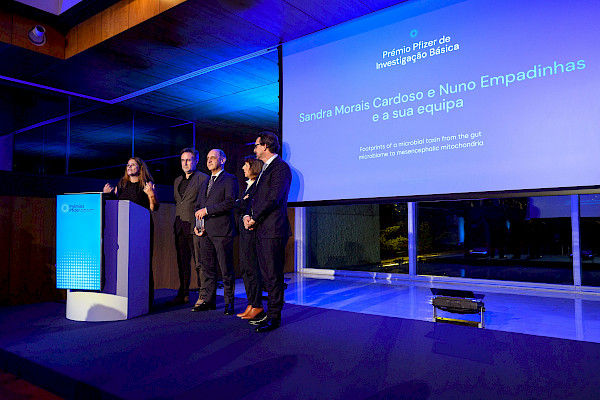UC scientists receive 2023 Pfizer Award for their research on Parkinson's disease
Researchers Sandra Morais Cardoso and Nuno Empadinhas conducted a study showing a direct link between the gut and Parkinson's disease, which led to the scientists receiving the 2023 Pfizer Award for basic research.
Translation by Diana Taborda
The 2023 Pfizer Award for Basic Research will be presented today to Sandra Morais Cardoso, professor at the Faculty of Medicine of the University of Coimbra (FMUC) and researcher at the Centre for Neuroscience and Cell Biology of the University of Coimbra (CNC-UC), and Nuno Empadinhas, researcher at CNC-UC, in recognition of their research study showing a direct link between the gut and Parkinson's disease.
This research is one of the winners of the 67th edition of the Pfizer Awards, the oldest biomedical research prize in Portugal, which aims to support and promote biomedical research in the country. This year, total of 60,000 euros will be awarded to one clinical research project and one basic research project.
Parkinson's disease (PD) is a multifactorial disorder characterised by a long early onset phase that often includes gastrointestinal symptoms. Recently, a direct link has been established between changes in the gut microbiome and the onset and progression of the disease. Chronic exposure to the microbial toxin β-N-methylamino-L-alanine (BMAA) found in certain foods is thought to be the cause of ALS-Parkinsonism-Dementia Complex (ALS-PDC) in certain populations whose diets are rich in these foods.
Sandra Morais Cardoso, Nuno Empadinhas and their teams have shown in this study that the BMAA toxin, when chronically ingested, alters the gut microbiome and triggers a neurodegenerative process consistent with Parkinson's disease. This is of particular concern given that this toxin is commonly found in seafood, shellfish and fish but is not monitored by public health authorities. Also, the toxin directly interferes with mitochondria, essential cellular organelles that have evolved from ancestral bacteria.
The researchers explain that they “observed that chronic supplementation of the diet of laboratory mice with BMAA was associated with a severe decrease of very specific groups of bacteria that protect the intestinal mucosa and regulate immunity within this essential barrier. Gut barrier damage led to systemic inflammation and blood-brain barrier permeability, where mitochondrial dysfunction and innate immunity activation induced and amplified inflammation in the brain. This chain of events led to the loss of midbrain dopamine neurons and motor dysfunction similar to that observed in Parkinson's patients," they add.
In addition to Nuno Empadinhas and Sandra Morais Cardoso, researchers Ana Raquel Esteves, Mário Muñoz Pinto, Daniela Costa, Emanuel Candeias, Diana Silva, João Magalhães, Ana Raquel Santos, Ildete Ferreira, Susana Alarico and Igor Tiago also collaborated on the study.
“We are very pleased to celebrate another edition of the Pfizer Awards, aware of the immeasurable value that advances in science and medicine bring to our lives," said Paulo Teixeira, CEO of Pfizer Portugal, adding, "We believe that the work rewarded in this edition, as in previous ones, helps to improve people's lives and confirms that health and science must be united in the search for new therapeutic solutions".



